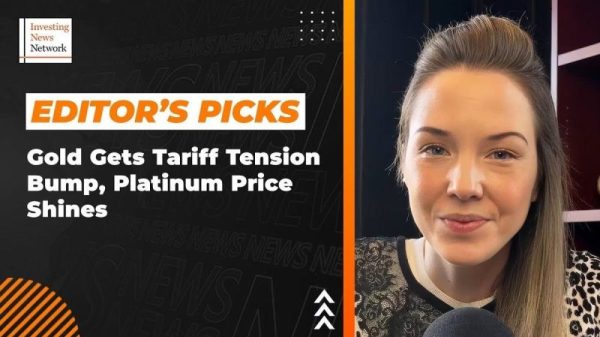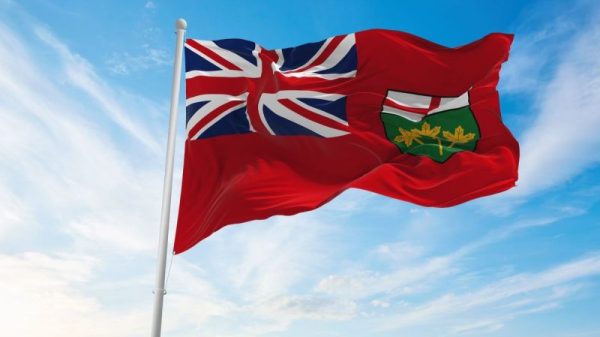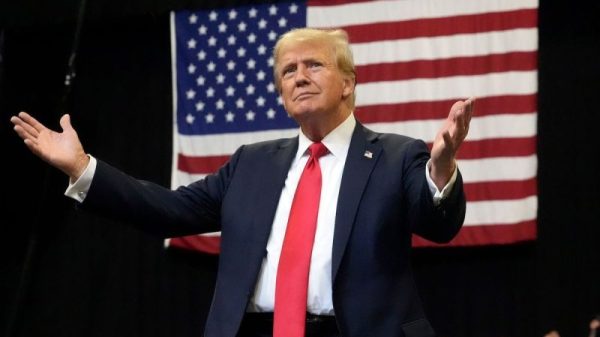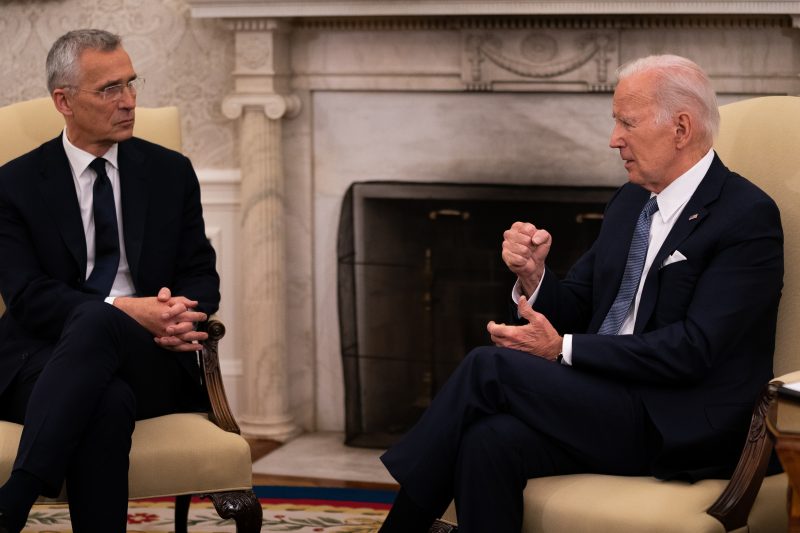One year after NATO sent a strong message to Russia at a unified, defiant summit in Madrid, President Biden will return to Europe on Monday aiming to conjure a similar sense of joint purpose, but increasingly evident fractures as the Ukraine war slogs into its second year could make unity more elusive.
During a five-day trip to three countries, Biden plans to hail NATO’s recent admission of Finland, but he must navigate thorny divisions over whether to expand the alliance further. Two increasingly divisive issues are expected to dominate the Summit in Lithuania, where Biden will travel between stops in London and Helsinki: Ukraine’s desire to join the alliance and Sweden’s stalled bid to do the same.
Biden’s ability to keep NATO unified in responding to Russia’s aggression has become a key component of his reelection pitch. But with Turkey blocking Sweden from joining, a Ukrainian counteroffensive lagging, and fresh tensions over Biden’s decision to give Ukraine cluster munitions, his meetings in Europe could become visibly contentious.
Especially fraught is Ukraine’s push to join NATO. Some allies — including summit host Lithuania — welcome the idea, while countries like the United States and Germany warn it would instantly escalate the confrontation with Russia, potentially to a nuclear level.
Biden “has been clear that we are going to support Ukraine for as long as it takes and provide them an exceptional quantity of arms and capabilities — both from ourselves and facilitating those from allies and partners — but that we are not seeking to start World War III,” Jake Sullivan, Biden’s national security adviser, said Friday. “That is the course that we’ve been on since the start of this conflict.”
Ramping up the pressure, Ukrainian President Volodymyr Zelensky, in an interview broadcast on CNN on Wednesday evening, called on Biden to invite Ukraine into the organization “now.”
Biden has been publicly noncommittal, telling reporters recently that the United States would not “make it easy” for Ukraine to join the group. NATO has historically rejected countries that are in the midst of an active invasion or occupation, because it would instantly embroil the alliance in hostilities, given its principle that an attack on one is an attack on all.
NATO also seeks to ensure that its members uphold democracy and free markets. Sullivan told reporters that Ukraine needs to make “additional reforms” to become NATO-eligible.
But with U.S. officials publicly vague on what exactly it would take for Ukraine to join, and given Biden’s history of initially denying Zelensky’s requests before ultimately relenting, his words and actions will be tracked closely during his trip for any sign that his position may be softening.
For now, administration officials are scrambling to assemble a package of “security guarantees” that NATO could formally offer Ukraine during the summit. These commitments would fall short of a path to membership but signal a commitment to stand by the beleaguered country.
Experts and observers said this compromise would probably imply the need for an end to the war with Russia before Ukraine can join the alliance. “There are no real expectations in Ukraine that we will join NATO while there is war in Ukraine,” said Yevgeniya Gaber, an expert on the country at the Atlantic Council. “There is no real expectation that we will get this invitation in Vilnius.”
Biden will also need to factor in the domestic political landscape. Many of his Republican rivals, including former president Donald Trump and Florida Gov. Ron DeSantis, have expressed concern about open-ended U.S. support for Ukraine, and even some Democrats worry that the public will grow weary of America’s investment in the war.
“President Zelensky is under the view that whatever he pushes for hard enough and long enough he’ll get, because that’s been the case with virtually everything we’ve seen to date,” said Michael O’Hanlon, director of research in foreign policy at the Brookings Institution. “I’m afraid he may be wrong on this question, because not only Joe Biden, but Donald Trump and Ron DeSantis, all seem skeptical of the idea of Ukraine being in NATO.”
Biden kicks off his trip with a brief stop Monday in London, where he will meet with British Prime Minister Rishi Sunak and have his first face-to-face meeting with King Charles III since his coronation.
He will then attend the NATO summit in Vilnius, Lithuania, on Tuesday, holding meetings with his counterparts before delivering what White House aides describe as a “significant” speech about his global vision on Wednesday. Biden will then travel to Helsinki to mark Finland’s accession to NATO and meet with Nordic leaders.
White House officials hope the trip will send a message to Russian President Vladimir Putin that NATO remains committed to supporting Ukraine for the long term. The stop in Finland could draw comparisons to Trump’s 2018 visit to Helsinki, when he sided with Putin against U.S. intelligence officials during a news conference.
While Trump relished disrupting global alliances like NATO, Biden has sought to reassure domestic and global audiences that he is a steady hand capable of reasserting American leadership on the world stage. The war in Ukraine has become the most significant test of Biden’s ability to deliver on that proposition, and next week’s NATO summit will be the latest in a series of global gatherings where the conflict has dominated the agenda.
But as the war has dragged on — costing billions of dollars and slamming the global economy — it has become increasingly difficult for world leaders to find consensus.
One potential collision at the summit was averted when NATO Secretary General Jens Stoltenberg recently agreed to extend his term by a year, avoiding a potentially bruising fight to succeed him.
Biden is still fighting a last-ditch effort to salvage Sweden’s accession, which has been blocked for many months, primarily over objections from Turkey and its ally Hungary. Turkish President Recep Tayyip Erdogan complained that Sweden is too accommodating toward the militant Kurdistan Workers’ Party, or PKK, which has waged a long insurgency in Turkey and is considered a terrorist group by the United States and the European Union.
There is little chance Turkey and Hungary will ratify Swedish accession before the summit, diplomats said, though some expressed hope that Biden and other allies could at least persuade Erdogan to agree to a deal that would allow the process to move forward. Stoltenberg has said he will convene a meeting of Swedish and Turkish leaders Monday.
Sullivan said Biden would meet with Erdogan in Vilnius and that it was “possible” a deal on Sweden would emerge from the summit. “It’s a question of time,” he said. “And I can’t predict whether that will happen next week or at some point in the ensuing weeks.”
Equally fraught is the question of whether the NATO allies will spend more on defense. After Russia’s invasion, the alliance began what it called its biggest overhaul since the Cold War, reinforcing its eastern flank and rethinking its approach to deterrence and defense.
Leaders will formally approve an ambitious set of defense plans in Vilnius, but it will require major investments for them to become reality. NATO for years has expected its members to spend at least 2 percent of their GDP on defense, but even with many allies boosting their spending in the face of Moscow’s aggression, several remain far from the target.
Stoltenberg said he expects allies to agree to make spending 2 percent of GDP “a floor,” or minimum, but it is unclear how, or even if, that will be enforced.
Camille Grand, who until last year was NATO’s assistant secretary general for defense investment and is now a distinguished policy fellow with the European Council on Foreign Relations, said a big hike in defense spending is necessary if the group hopes to meet the moment. “If there is no sustained commitment to stay at 2 percent or above, the plans will be hard to implement,” Grand said.
But few issues are likely to be as contentious at the summit as the question of Ukraine’s membership.
NATO allies have all but ruled out immediate membership for Kyiv on account of the war, but the allies remain split on what should happen next.
Some NATO members, particularly those in Eastern Europe, have pushed for a clear path or timeline for Ukraine to join the group. The Biden administration has shown some support for plans to remove barriers to Ukraine’s entry, but has strongly resisted the idea of a specific timeline.
While Poland and Italy have called for concrete security guarantees, and French President Emmanuel Macron has said there should be a clear “path” for Ukraine’s NATO membership, Germany and the United States have been perceived as more reluctant.
Several countries are now hashing out interim options to provide security guarantees and other long-term assurances to Kyiv that fall short of full membership. With Zelensky scheduled to attend the summit, diplomats are scrambling to find language that signals strong support while keeping the prospects for membership vague.
Britain, France, Germany and the United States have been leading the initiative on a document aimed at assuring Ukraine that an invasion like the current one would not be allowed to happen again, according to two Western diplomats who spoke on the condition of anonymity to discuss sensitive matters.
“It is something that is not a transition toward NATO, it’s just a simple security guarantee,” one of the diplomats said.
That approach is unlikely to please Zelensky, whose aspirations are likely to be left “unfulfilled,” retired U.S. Army Lt. Gen. Ben Hodges, a former commander of U.S. Army Europe, said.
“It is clear that the United States is not pushing for membership,” Hodges said. “They are either slow-rolling it or not exerting the energy to get everyone on board.”
Sullivan said Biden would be happy to meet with Zelensky during the summit, where he said “important practical announcements” would be made about Ukraine’s relationship with NATO. Among other actions, leaders in Vilnius are expected to upgrade the authority of a joint NATO-Ukraine body that oversees the relationship.
Biden, meanwhile, has sought to step up U.S. support for Ukraine in other ways in recent days, including by approving the provision of cluster munitions, weapons that are banned by most countries in the world, including several NATO members. With Ukraine’s military running low on conventional artillery, Biden hoped to underline his commitment that the U.S. and the broader Western world would stand by Ukraine “as long as it takes.”
Amid the lack of consensus within the alliance, many of Biden’s counterparts will be looking to him to hash out a formal declaration at the summit that will showcase a united front and continued resolve.
“How do you find a form of words that will work in D.C., Berlin, London, Paris and beyond?” a Western diplomat said, speaking on the condition of anonymity to discuss sensitive issues. “But it’s not about the words — it will be about the substance that underpins it.”

































